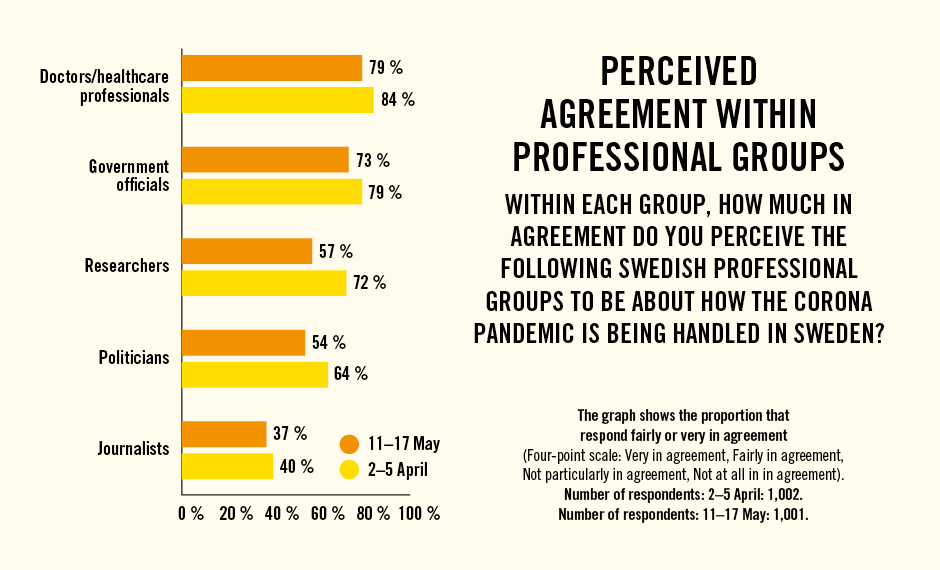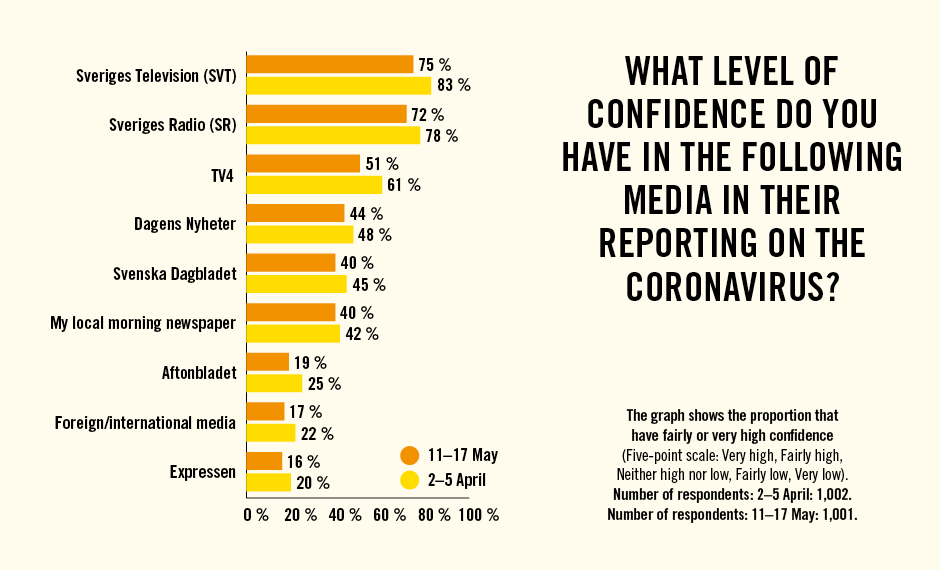The Swedish public’s confidence in politicians who comment about coronavirus in the news is decreasing. Both researchers and politicians are perceived to be less in agreement about Sweden’s handling of the pandemic than in the previous month. These are the latest findings of a study being conducted by the Swedish non-profit organisation VA (Public & Science).

In collaboration with researchers from the Karolinska Institute and Södertörn University, VA (Public & Science) is conducting a study of how people are receiving and interpreting information about the coronavirus and the ongoing pandemic. Here, we present the findings from the fourth wave of the survey, which was undertaken between 11–17 May 2020.
Decreased confidence in politicians
As in earlier waves of the survey, the Swedish public has the greatest confidence in doctors and other healthcare professionals among the different professional groups that comment about the coronavirus in the news media. Ninety percent have fairly or very high confidence in healthcare professionals, followed by researchers (82 percent) and government officials (68 percent). One clear difference from the previous wave of the survey conducted at the end of April is that confidence in politicians has decreased by 12 percentage points, from 40 percent to 28 percent. The decrease is particularly evident among supporters of the Centre Party and among persons living outside of the three largest cities in Sweden.

Increased disagreement among researchers
Swedes perceive there to be less agreement among different professional groups’ views on Sweden’s handling of the coronavirus than in a previous wave of the survey conducted in early April. The biggest decrease can be seen in the perceived level of agreement between researchers.. The proportion that believes that researchers are fairly or very in agreement about Sweden’s management of the coronavirus has decreased by 15 percentage points (from 72 to 57 percent). Politicians are also considered to be less in agreement today. Here, the corresponding proportion has decreased by 10 percentage points (from 64 to 54 percent). Overall, agreement is perceived to have slightly decreased among all of the groups, but their relative ranking order remains the same as previously. A relatively large proportion of Swedes still believe that doctors/healthcare professionals and government officials are in agreement on Sweden’s handling of the pandemic (79 and 73 percent, respectively), compared with other professional groups.

Highest but weakened confidence in SVT
Confidence in several Swedish news media’s reporting on the coronavirus has decreased compared to in our previous survey carried out in April. However, several of the differences are not statistically significant. We can see a weakening of confidence in news from Swedish Television (SVT) (which has decreased by eight percentage points) and TV4 (which has decreased by ten percentage points). However, confidence still remains high in relation to other media. Three out of four Swedes (75 percent) have fairly or very high confidence in SVT’s reporting on the coronavirus and half (51 percent) have high confidence in TV4. Similar to when the question was asked previously, people aged 65 or older have higher confidence in SVT (81 percent) and TV4 (57 percent). Confidence has also decreased in Swedish Radio (SR), where 72 percent now have fairly or very high confidence compared to 78 percent in April.

About the survey
The survey was conducted by Kantar Sifo and consisted of 1,001 interviews with a web panel based on random sampling. The interviews were conducted between 11-17 May. The results are weighted based on gender, age and region of residence.
Ongoing studies
In order to monitor the Swedish public’s news consumption, confidence in key professional groups and attitudes towards media reporting over time, we intend to conduct further studies during the course of the pandemic. We also plan to undertake a content analysis of reporting on the coronavirus in the Swedish media in order to map any changes in reporting during different phases, and how this relates to public attitudes during the same time period.
The study is being conducted with the support of the Anne-Marie and Gustaf Anders Foundation for Media Research, LIF – the Swedish Association of the Pharmaceutical Industry, the Wenner-Gren Foundations and the Swedish Research Council.
Read more about VA’s study and the results of the first, second and third waves of the study.
